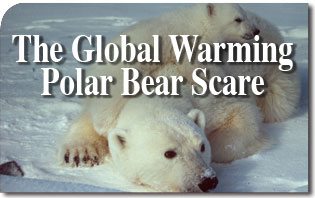 In November 1999, the BBC ran an article with an alarming title, “Global Warming Could Starve Polar Bears.” The main argument was that man-made greenhouse gases were increasing in disturbing amounts and causing the aggregate global temperature to increase dramatically melting arctic ice. This shortened the hunting season for polar bears because there was too little ice for them to hunt from. Bears were returning to land after a futile hunt for ringed seals, which left them in poor condition, breeding less and facing extinction. The cause of disaster, of course, was global warming.
In November 1999, the BBC ran an article with an alarming title, “Global Warming Could Starve Polar Bears.” The main argument was that man-made greenhouse gases were increasing in disturbing amounts and causing the aggregate global temperature to increase dramatically melting arctic ice. This shortened the hunting season for polar bears because there was too little ice for them to hunt from. Bears were returning to land after a futile hunt for ringed seals, which left them in poor condition, breeding less and facing extinction. The cause of disaster, of course, was global warming.
NASA had announced that arctic ice had declined by 2.9 percent during the nineties. This, in turn, reduced the bear’s hunting season by approximately three weeks. One might conclude that if the polar bear population was in rapid decline in 1999, by now it should almost be extinct.
Greenpeace climate campaigner Stephanie Tunmore demanded that “world governments must intensify negotiations to cut greenhouse gas emissions while simultaneously begin phasing out fossil fuels and switch to renewables.”1 As per the leftist playbook, hype, scare, emotional arguments and the omission of inconvenient facts aimed to influence a portion of public opinion that prefers not to reflect. There is no evidence of global warming let alone that it is man-made and scarcely little evidence that polar bears are much affected by human activity.
In 2007, advocates of global warming at the BBC wrote yet another article titled “Arctic summers ice-free ‘by 2013’”2 Ironically, nature provided for an unusually frigid summer in 2013 creating an additional 533,000 square miles of frozen ocean resulting in an increase of 29 percent more ice in less than 12 months. Anyone following the presentation of arguments by environmental zealots versus the facts is left mystified how the global warming crowd can save face.
With 35 years of polar bear study to her credit, Dr. Susan J. Crockford, an evolutionary biologist from British Columbia, states that polar bears are now in jeopardy of a declining population due to too much ice with ice flows of 15 feet or thicker. Again, the reason for this threat is due to the difficulty in obtaining ringed seals for food. Similar to happened previously, biologists reported finding some bears rather thin coupled with what appears to be a declining population and simply attributed it to global warming.
There are 19 subpopulations of polar bears worldwide, and while some fluctuate in population, others have grown steadily. No one knows for certain what the exact number to be with estimates ranging between 20,000 and 40,000. One thing is for certain, the polar bear population has grown in leaps and bounds in the last 40 years—ironically during much of the period when alleged man-made global warming was supposedly killing off the bears.
The global authority on polar bears, the international Polar Bear Specialist Group (PBSG) has reported that polar bear population has been in decline without taking into account that polar bears merely move to other areas if their food supply disappears. If some bears simply move and had been part of an initial count, it would appear as if the population was declining when in fact there was only an insignificant change in total numbers. This fact contradicts the claim that man-made greenhouse gasses are the cause of the polar bear decline.
The reports from left wing liberal environmentalists are essentially devoid of concrete evidence while overlooking historical climate behavior. One need not be a climatologist to understand the difference between weather and climate and the natural fluctuations of both clearly indicated in historical records.
So one is left perplexed as to what to believe. Do the polar bears have too much or too little ice and who made what problem? The only thing that appears clear is that the public is suffering from a global warming polar bear scare that furthers the green agenda.

